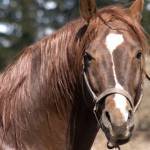Gastric Ulcers and Behavior in Horses

Many horses that show irritability, low-level colic, poor appetite, and resistance to work may be reacting to the discomfort of gastric ulcers. Some of these horses show a remarkable turnaround in attitude after receiving anti-ulcer medication, seeming to indicate that they are more comfortable and therefore are better able to eat and train. But do all horses with gastric ulcers show these signs?
A study in Denmark looked at behavior of 98 horses kept at a private farm and fed equal amounts of starches and hay. All horses were at a desirable weight, and only one horse was a cribber. The horses were examined by gastroscope to determine the presence or absence of ulceration in both the upper and lower areas of the stomach. Severe ulceration (scoring 3 or 4 out of a maximum 4) was found in 33 horses, and 30 had at least one lesion in the lower glandular area of the stomach, where ulceration is usually considered less likely to occur.
Heart rate and cortisol levels were measured in both ulcerated and nonulcerated horses. The horses were shown a new object to see how they reacted to a stressful situation. They were also fed a small amount of feed instead of their full meal on the day after the new-object test to see whether this change in routine would trigger habits such as cribbing, a behavior sometimes linked to stress.
There was almost no difference in the eating habits of the two groups. The ulcerated horses had a slight tendency to eat more quickly, and also seemed more sensitive to acute stress as indicated by a higher endocrine response after the novel-object test. However, they were not judged to be more fearful.
The researchers concluded that ulcerated horses don’t reliably look or act differently than nonulcerated horses. Owners should not rely completely on behavior to indicate whether horses have discomfort from gastric ulcers, but should ask a veterinarian to examine both the upper and lower regions of the stomach in any horse suspected of having ulcers.








